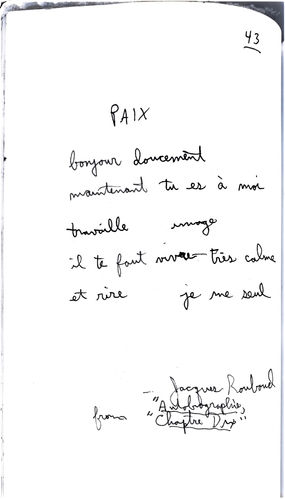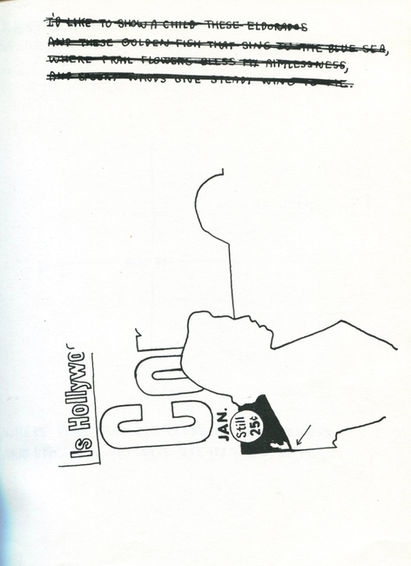
Ted Berrigan's Translations
From River under the House
A Paul Valery - Joao Cabral de Melo Neto
From River under the House, a collection of poems translated by Ted Berrigan and Gordon Brotherston, there are three poems that appear in Berrigan's notebook: The Asra, To Carlos Drummond de Andrade, and A Paul Valery. For these three poems, the photo galleries to the right show the transformation from the original poem to Berrigan and Brotherston's notes written in Berrigan's notebook in 1973 and then to the final, translated version.
The formats of the translation process shown in Berrigan's notebook for the poems To Carlos Drummond de Andrade and A Paul Valery are very similar, where the original, typed copy of the poem is cut-out into separate stanzas and are pasted on the left side of the notebook, and the translation is hand-written by Berrigan on the right side. On the left side, there are notes on the sides and arrows between stanzas written directly on the original version of the poem. If you look close, you'll notice that each word often has its translation written right above the original language, which suggests that Berrigan and Brotherston often translated poems word-by-word. For To Paul Valery, there is a translation that is cut-out and pasted on the right side of the poem in Brotherston's handwriting. This implies that Berrigan and Brotherston worked collaboratively and that Berrigan has possibly made modifications to Brotherston's translations. On the right side, all of the translations are written in Berrigan's handwriting. The two poems are accompanied by sketches on the side, which seem to represent scenes from the poems; umbrellas in To Carlos Drummond de Andrade and "man on the beach" in To Paul Valery. These sketches imply that Berrigan tried to visualize the poems while making these translations. In addition, many of the words are being crossed out and re-written, which suggests that their translation process involved multiple modifications before reaching the final published versions.
The poem The Asra is translated slightly differently from the two other translations described above. Instead of having a typed copy of the original version on the left and the translated version on the right, a single page is used containing the original poem, notes on the sides, brackets connecting stanzas, and word-by-word translations, all in Berrigan's handwriting. Although Berrigan may have left his remaining work somewhere other than this notebook, the consistency in his translation format is evident from these three translations.
A Carlos Drummond De Andrade - Joao Cabral de Melo Neto
Der Asra - Heinrich Heine
Other Translations in Berrigan's Notebook
Outside of the book River under the House, Berrigan leaves his work of translations on two other poems in another notebook: Peace and JJ, which are both written by Jacques Roubaud. Berrigan’s strong interest in translating poems is apparent, as these works are not published. According to Literature Online biography, Berrigan mentions that when one is imitating someone’s poem, “the good parts will come out of where you misunderstand entirely what the poet you are imitating is doing” and that “misunderstanding is one of the truly creative procedures in writing.” This remark suggests the possibility that Berrigan’s appreciation in what comes out of misunderstanding pushed him to explore the field of translation.
Paix - Jacques Roubaud
JJ - Jacques Roubaud
From The Sonnets
Below are two versions of the poem "Mes Occupations"; on the left is the original poem written in French by Henri Michaux, and on the right is Berrigan's translation of the same poem, which is featured in his book The Sonnets. Berrigan writes the English version using an experimental translation process called homophonic translation, which means to translate only by phonetic similarity instead of dictionary meaning. In other words, it means to translate for sound rather than for sense. Berrigan's translation of "Mess Occupations" alone clearly does not make sense in terms of its meaning, but when you carefully compare it with the original version in French, it is clear that they simply sound similar. The playfulness and originality that can be observed through this translation may be reflecting Berrigan's willingness to explore the field of poetry translation.


Mes Occupations
- Henri Michaux
Je peux rarement voir quelqu'un sans le battre.
D'autres préfèrent le monologue intérieur.
Moi non. J'aime mieux battre.
Il y a des gens qui s'assoient en face de moi au restaurant
et ne disent rien,
ils restent un certain temps, car ils ont décidé de manger.
En voici un.
Je te l'agrippe, toc.
Je te le ragrippe, toc.
Je le pends au portemanteau.
Je le décroche.
Je le repends.
Je le décroche.
Je le mets sur la table, je le tasse et l'étouffe.
Je le salis, je l'inonde.
Il revit.
Je le rince, je l'étire (je commence à m'énerver, il faut en finir), je le masse, je le serre, je le résume et l'introduis dans mon verre, et jette ostensiblement le contenu par terre, et dis au garçon: «Mettez-moi donc un verre plus propre.»
Mais je me sens mal, je règle promptement l'addition et je m'en vais.
Translation of The Drunken Boat
The Drunken Boat is a poem originally written in French by Arthur Rimbaud. Berrigan makes a translation for this poem but keeps it unpublished until 1974, when the mimeograph of this translation drawn by Joe Brainard was published. Interestingly, several lines from this translation are used in Berrigan's book The Sonnets, which was written before this mimeograph was published. The mimeograph, as well as a list of lines found in both of Berrigan's work, can be found below. Berrigan's translation of The Drunken Boat serves as a resource for him to recycle his own lines to use in The Sonnets. Perhaps creating translation helped inspire Berrigan when writing his own poems, which could be another reason why Berrigan actively translated foreign works.
Stanzas that may be familiar to readers of The Sonnets:
Where, dying all the blue, the maddened flames
And stately rhythms of the sun, stronger
Than alcohol, more great than song,
Fermented the bright red bitterness of love.
I’ve seen fermenting everglade-like weirs
Deep in whose reeds great elephants decay;
I’ve seen vast oceans crashing into ruin
And calm horizons cataracting away,
Sometimes when I grow weary, feel betrayed,
The gently rolling sea sets me at rest,
Lifting her shadowy waters up for me,
And I fall on my knees, womanly.
The only traveled sea that I still dream of
Is the cold black pond where once
On a fragrant evening fraught with sadness,
I launched a boat fragile as a butterfly.

































